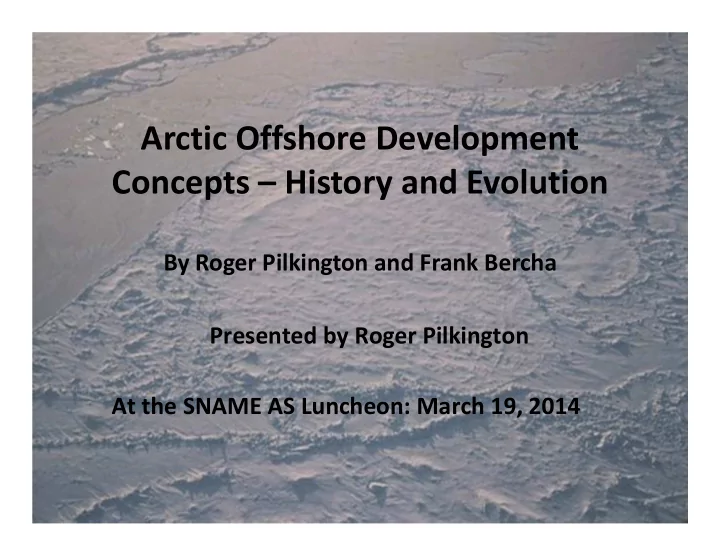

Arctic Offshore Development Concepts – History and Evolution By Roger Pilkington and Frank Bercha Presented by Roger Pilkington At the SNAME AS Luncheon: March 19, 2014
Presentation • Systems and structures used in Beaufort Sea from 1970 to 1990 • Some concepts for Beaufort Development 1980s • Production systems currently in use in Arctic • Some interesting new concepts
Rough Timetable • 1960s Panarctic drilled on Arctic Islands • In late 1960s Land sales in Beaufort Sea • Esso acquired land from 0 to ~15m Water Depth • Gulf acquired land from about 15 to about 30 m WD • Dome acquired land from about 30 to about 60m WD • From 1972s and 1989, Esso built sand and spray ice islands • ~1974 Canadian Government brought in Arctic drilling incentives • 1976 to about 1980 Dome brought 4 drillships, 8 support boats, super tanker, and floating dry dock into Arctic. 1980 Kigoriak.
Rough Timetable (Cont) • 1981 Dome built Tarsuit Island • 1982 Dome brought SSDC into Arctic • 1983 Esso brought in Caisson Retained Island (CRI) to operate in deeper waters • 1983 Gulf brought Kulluk barge, Molikpaq GBS and 4 support vessels into Arctic • 1984 oil price went down and Government ended drilling incentives • All activity stopped in about 1994
Esso Gulf Dome
The 3 Major Ice Zones in Arctic
Esso ‐ Nipterk Ice Island M ade from flooding ice with water from large pumps Shallow water only
Esso sand and gravel island construction in summer and also winter by hauling sand and gravel in trucks over ice
Artificial Islands • Ice islands – typically 0 to 3m • Sand and gravel islands – typically 3 to 8m • Cost of sand and gravel islands is ~ to cube of water depth Hence • Caisson retained island for deeper water
Dome’s Tarsiut Island
Tarsuit: Close up of rock filled gabions used to stop wave overtopping and wave erosion
Esso Caisson Retained Island (CRI) In Tuk Harbour Esso CRI drilling in Landfast ice
Dome Petroleum • Dome needed ships to drill in the deeper waters • In 1970 Dome started construction of 4 ice strengthened drillships • Explorers 1 to 3 built out of hulls of Liberty Ships • Explorer 4 was drillship • Dome added steel sponson tanks to sides of ships to protect them against the ice • 8 anchors used to maintain location (fixed orientation) • Dome also constructed 4 ice breaking support boats and bought others (Suppliers 1 to 8). They also brought in a super tanker full of fuel, dry dock, 2 big icebreakers
Canmar Explorer Explorers operated from late June to late October.
Dome Explorers operating in ice Ships operated from about late June to end October. They could operate in up to about 5/10 ice cover in summer Explorer 2 operating in 20cm thick ice Nov 15 th 1978 Note ice management in background
Left Canmar Suppliers (4 constructed) Below Ice Breaker Canmar Kigoriak and Robert Lemeur
Drillships • Operate in about 5/10 thick ice in summer • Operate in about 15 to 20 cm in fall (typically end Oct), with ice management • Problem ‐ vessels cannot rotate on mooring Hence • Kulluk ‐ operate in 6/10 to 8/10 thick ice in summer and up to 1.2m level ice in fall, with ice management.
Gulf’s Round Drill barge ‐ Kulluk Gulf’s Kulluk Could operate in about 8/10 thick ice in summer and up to 1.2m ice in fall
Gulf’s Icebreaking Supply Boat ‐ Kalvik Sister ship was Terry Fox Gulf’s Ice Strengthened Support Boat – Ikaluk Sister ship was Miscaroo
All Season Operations • Articifical islands provided all season operation in shallow water • Floating systems available in Beaufort Sea did not provide all season operation in deep water Hence • SSDC, Molikpaq,
Five Caissons used in Arctic
Dome’s Single Steel Drilling Caisson (SSDC) & Mat
Dome SSDC being positioned on location SSDC at Kogyuk. Note the large protective sprayed ice berm
Gulf’s Molikpaq Mobile arctic drilling structure Molikpaq with massive rubble pile
Global Marine CIDS used for exploration drilling in Alaskan Beaufort
From Timco and Frederking, 2009
Recommend
More recommend